The
Sinking
of the Estrellano by U-37 - A Survivor's Story
"She went down so fast, that those of us who got clear, were saved the trouble of jumping. We just simply swam away from her..."
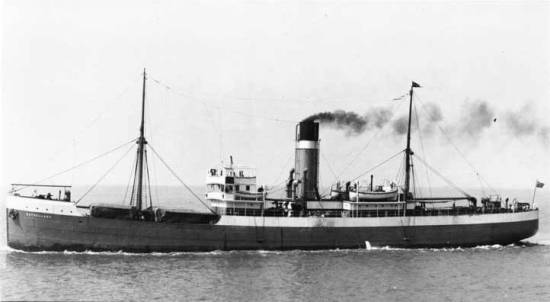
Photo courtesy of the Allen Collection (via uboat.net)
"She went down so fast, that those of us who got clear, were saved the trouble of jumping. We just simply swam away from her..."

Photo courtesy of the Allen Collection (via uboat.net)
The British steam merchant ship "Estrellano" while traveling in Convoy HG-53, was attacked and sunk on 9 February 1941 off Gibraltar.
According to uboat.net:
"At 04.30 hours on 9 Feb 1941, U-37 fired two G7a torpedoes at two ships in convoy HG-53 about 160 miles southwest of Cape St. Vincent and sank both ships, Courland and Estrellano.
At 05.00 hours, one G7e torpedo was fired, but it missed the ships in station #61 and #31 and did not hit a ship beyond them, as Clausen thought.
Five crew members from Estrellano (Master Fred Bird) were lost.
The master, 20 crew members and one gunner were picked up by HMS Deptford (L 53) (LtCdr G.A. Thring, DSO, RN) and landed at Liverpool.
One crew member died of wounds aboard the sloop and was buried at sea on 10 February."
The book, "Beware Raiders!: German Surface Raiders in the Second World War" by Bernard Edwards also depicts the attack and sinking:
"The Estrellano, a 1983-ton Mediterranean trader owned by the Ellerman & Papayanni Line of Liverpool, and commanded by Captain F. Bird, came to a sudden halt when Clausen's torpedo found its mark. The blast blew a great hole in her hull in way of No. 4 hold and reduced much of the port side of the superstructure to a tangled mass of metal. As the sea poured into her breached hull, the ship took a heavy list to port. Sending a brace of distress rockets soaring into the night sky to warn the other ships, Captain Bird ordered his crew to abandon ship without delay. This was not easy, for the port lifeboat had been wrecked by the blast and, as the ship was listing to port, great difficulty was experienced in swinging out the starboard boat. Brute force born out of desperation got the boat out and the men were boarding when the Estrellano suddenly went down by the stern. She remained afloat for only two minutes after being torpedoed.
The crowded lifeboat, still hooked onto its davits, went down with the ship, capsizing when it hit the water. The occupants were thrown into the sea to join the others who had jumped from the ship's rail. Their ordeal, frightening though it may have been, was not a long one. HMS Deptford, alerted by the bursting rockets, was quickly on the scene, hauling Captain Bird and twenty-one of his crew from the wreckage-strewn water. Five others were missing, never to be found, while one of the rescued, the young cabin boy McIntyre, died on board the sloop from his injuries.
Immediately after the torpedoing of the Estrellano, Commodore Dawson signalled an emergency turn of of 40 degrees to starboard, and the convoy swung sharply away from the danger. U-37 followed them around and crossed astern of the ships. Half an hour later Clausen fired a single torpedo from his stern tube, which narrowly missed the Commodore's ship Dagmar 1. Once again the darkness was rent by rockets bursting overhead. The Deptford raced in to drop a pattern of sixteen depth charges, but by this time Clausen had gone deep and was stealthily withdrawing out of range."
(taken from "Beware Raiders!: German Surface Raiders in the Second World War" Published by Leo Cooper, 2001 ISBN 0850528038, 9780850528039 224 pages)
One member of the crew, gunner John Sanders, kept a brief "illegal" diary documenting the attack and sinking. His son, Iain provided the information documented on this page.
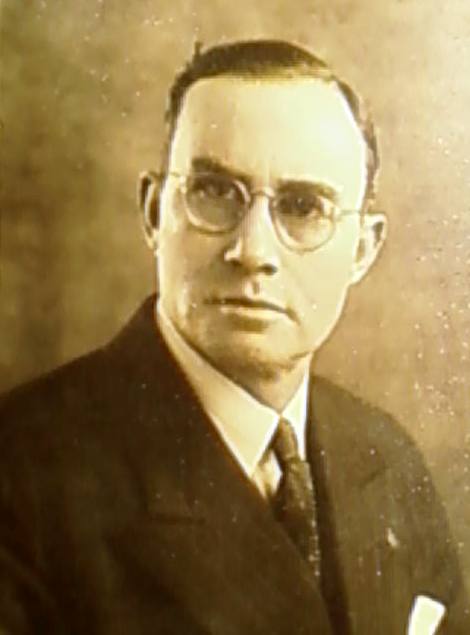
John Sanders, March 1941
BIO
John Sanders was born on 12 February 1901 in San Fernando, Durango, Mexico.
John's father was British, from a jeweler's family in Birmingham. He emigrated to the US via New Orleans in 1886.
At the time of John's birth John's father was the foundry manager and metallurgist at an American-owned copper mine in San Fernando.
In about 1912 the family moved to a small ranch in San Elizario, Texas, where his father died in 1913.
The family then moved to Los Angeles, California.
On 3 January 1916, at the age of 14 John entered World War I as a cadet midshipman with the sail-trading/training line Devitt & Moore, of Liverpool.
John received 3 medals for service during the war. He could not become an officer due to eyesight problems, but spent the years 1919-23 sailing about the world.
In 1928, after an excursion prospecting for timber concessions about the Rio Humaya, Durango, John settled into a career in life insurance in Los Angeles, California.
John was a member of the Hollywood branch of the Canadian Legion of the British Empire Service League up to 1939 when he returned to the UK.
After the sinking of the Estrellano, he joined the Army Intelligence Corps. He arrived in Algiers in May 1943. In August 1943 he was stationed in Italy, where he remained until October 1945.
John married in 1949 and settled in to working in life assurance for Colonial Mutual Life, an Australian firm.
In 1970 he semi-retired to The Isle of Skye, UK with his own similar business. John died on 11 May 1976 in Duntulm, The Isle of Skye, UK.
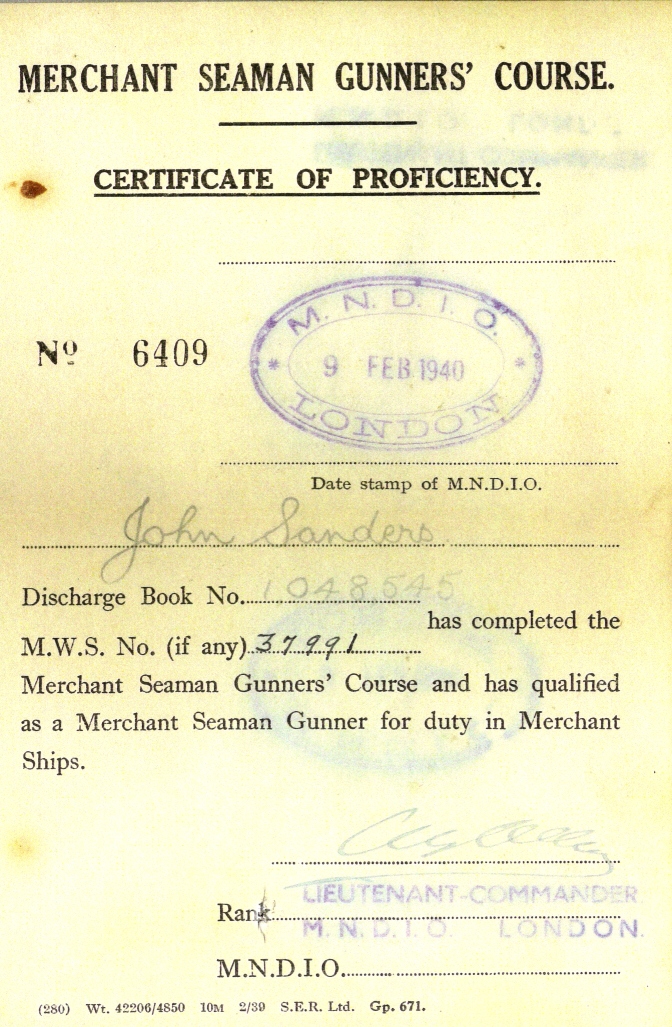
John Sanders served aboard the Estrellano as a gunner. Here is Certificate of Proficiency.
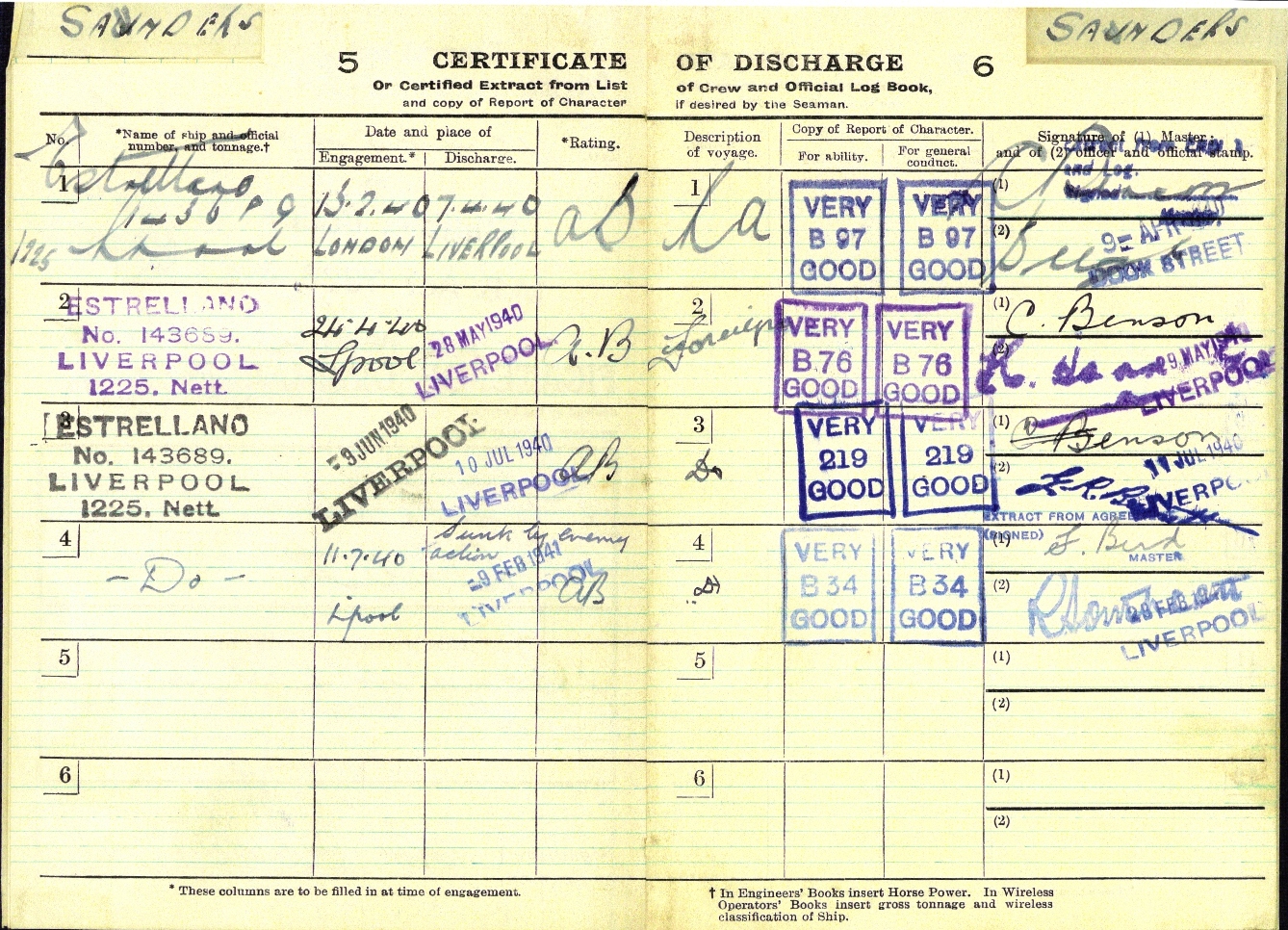
John Sanders' Certificate of Discharge showing his service on the Estrellano.
Sanders' Estrellano Diary
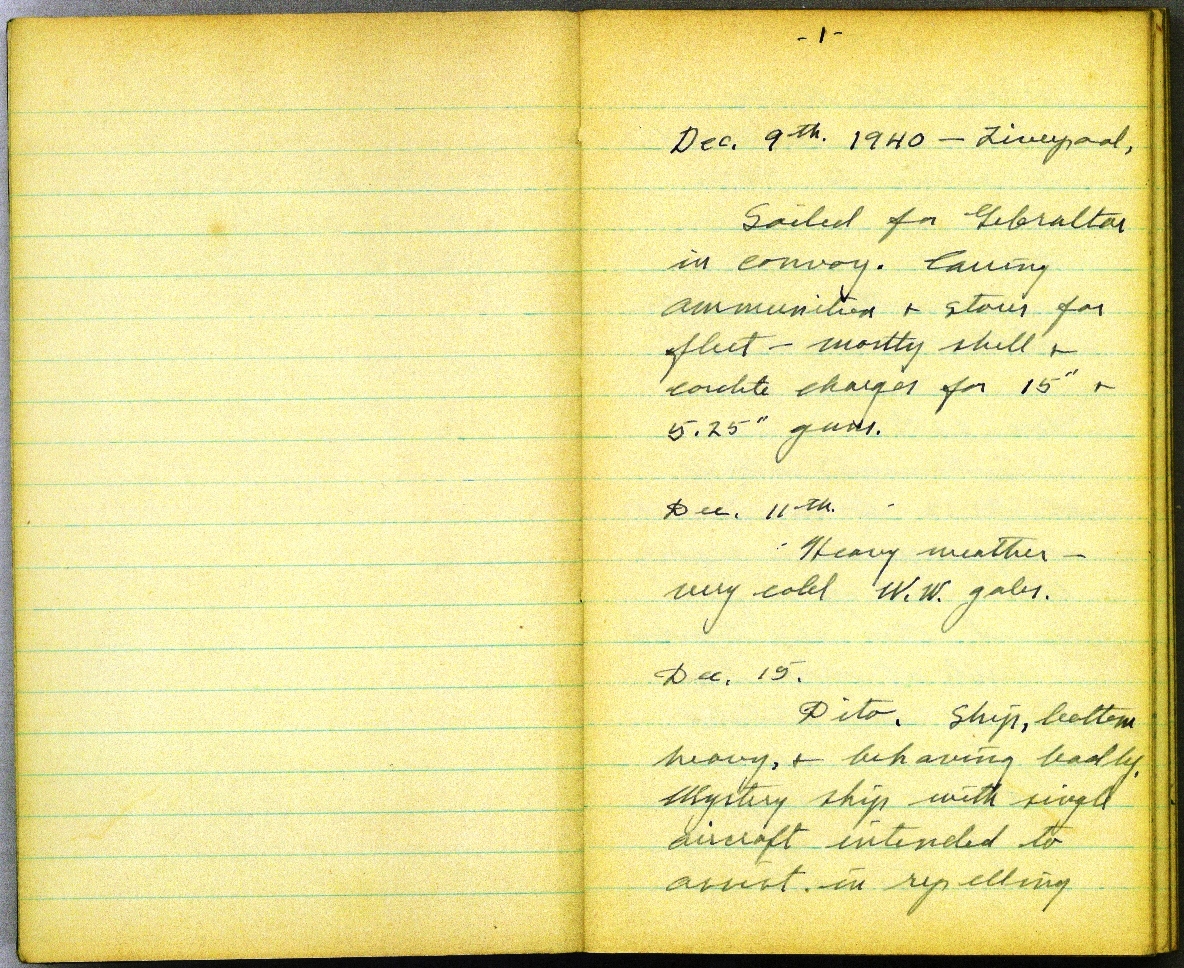
December 9th 1940 - Liverpool
Sailed for Gibraltar in convoy. Carrying ammunition & stores for fleet - mostly shell & cordite charges for 15" & 5.25" guns
December 11th
Heavy weather - very cold. W.W. gales
December 15th
Dito. Ship, bottom heavy, & behaving badly. Mystery ship with single aircraft intended to assist in repelling
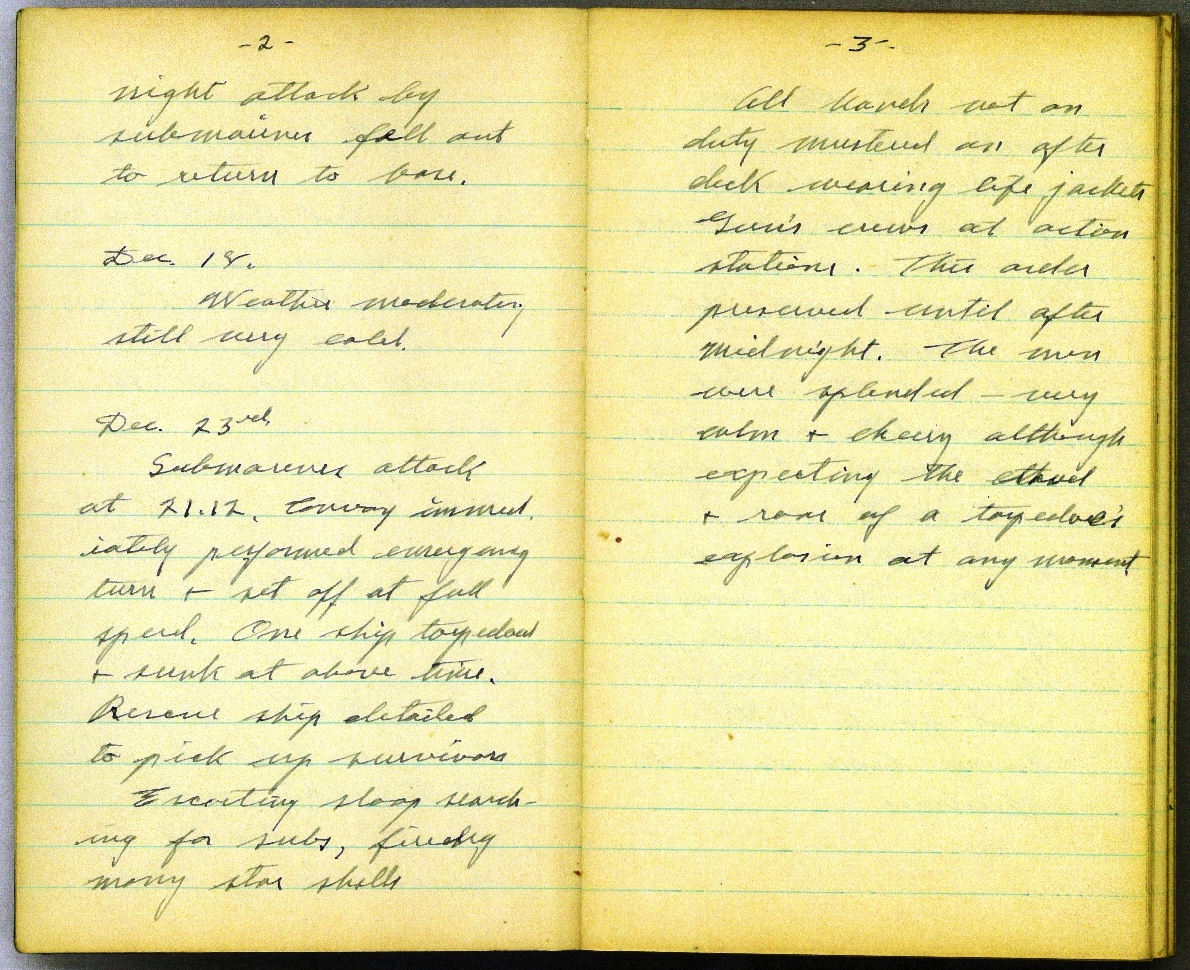
night attack by submarines fall out and return to base.
Dec. 18.
Weather moderating, still very cold.
Dec. 23rd
Submarine attack at 21.12. Convoy immediately performed emergency turn & set off at full speed. One ship torpedoed & sunk at above time.
Rescue ship detailed to pick up survivors. Escorting sloop searching for subs, firing many star shells.
All hands not on duty mustered on after deck wearing life jackets. Gun's crews at action stations.
This order preserved until after midnight.
The men were splendid - very calm & cheery although expecting the thud and roar of a torpedoes explosion at any moment.
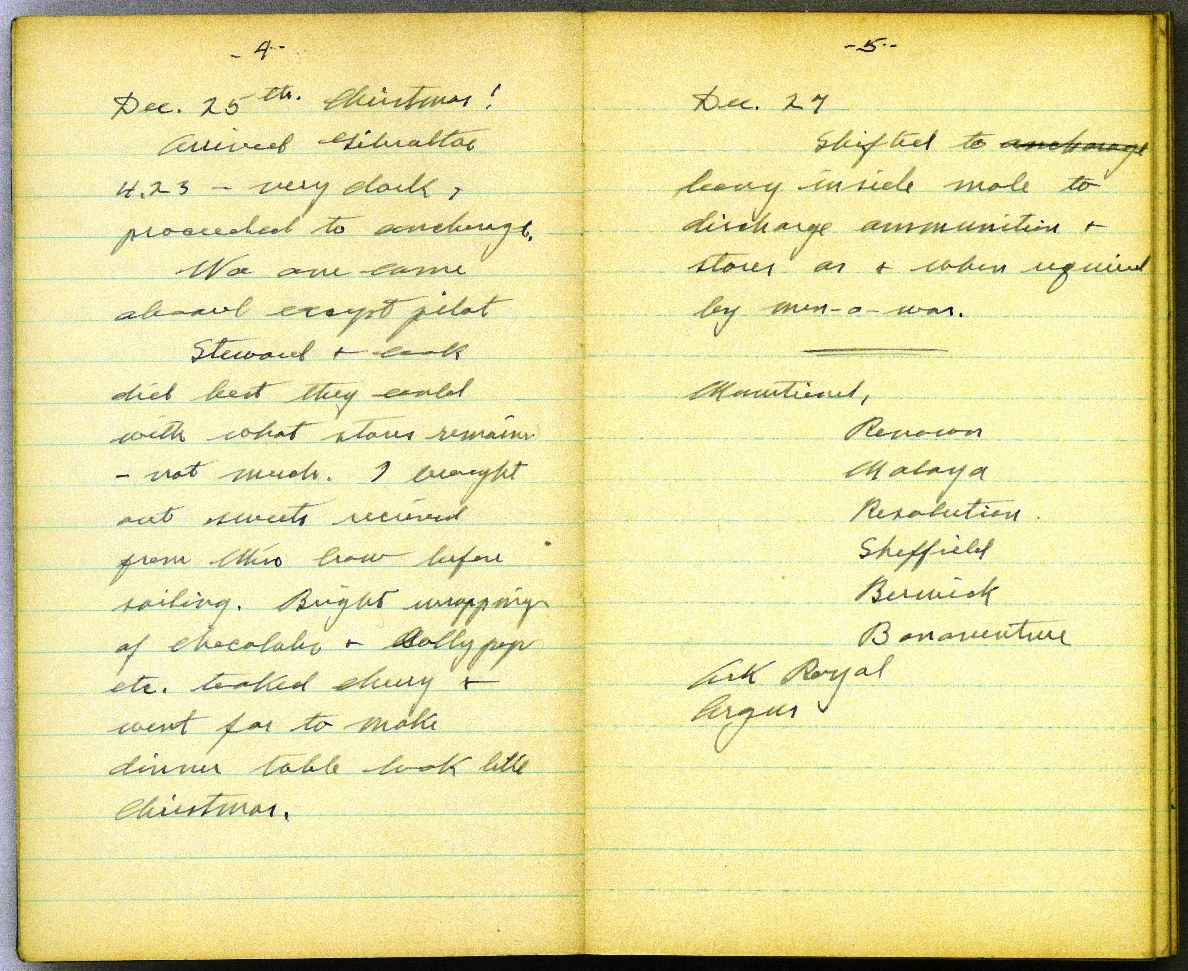
Dec. 25th Christmas!
Arrived Gibraltar 4.23 - very dark, proceeded to anchorage. No one came aboard except pilot.
Steward & cook did did best they could with what stores remain - not much.
I brought out sweets received from Miss Crow before sailing. Bright wrapping of chocolate & holly paper etc. Looked shiny and went for to make dinner table look little Christmas.
Dec. 27
Shifted to anchorage heavy inside mole to discharge ammunition & stores as & when required by men-o-war.
Munitioned,
Renown
Malaya
Resolution
Sheffield
Berwick
Bonaventure
Ark Royal
Argus
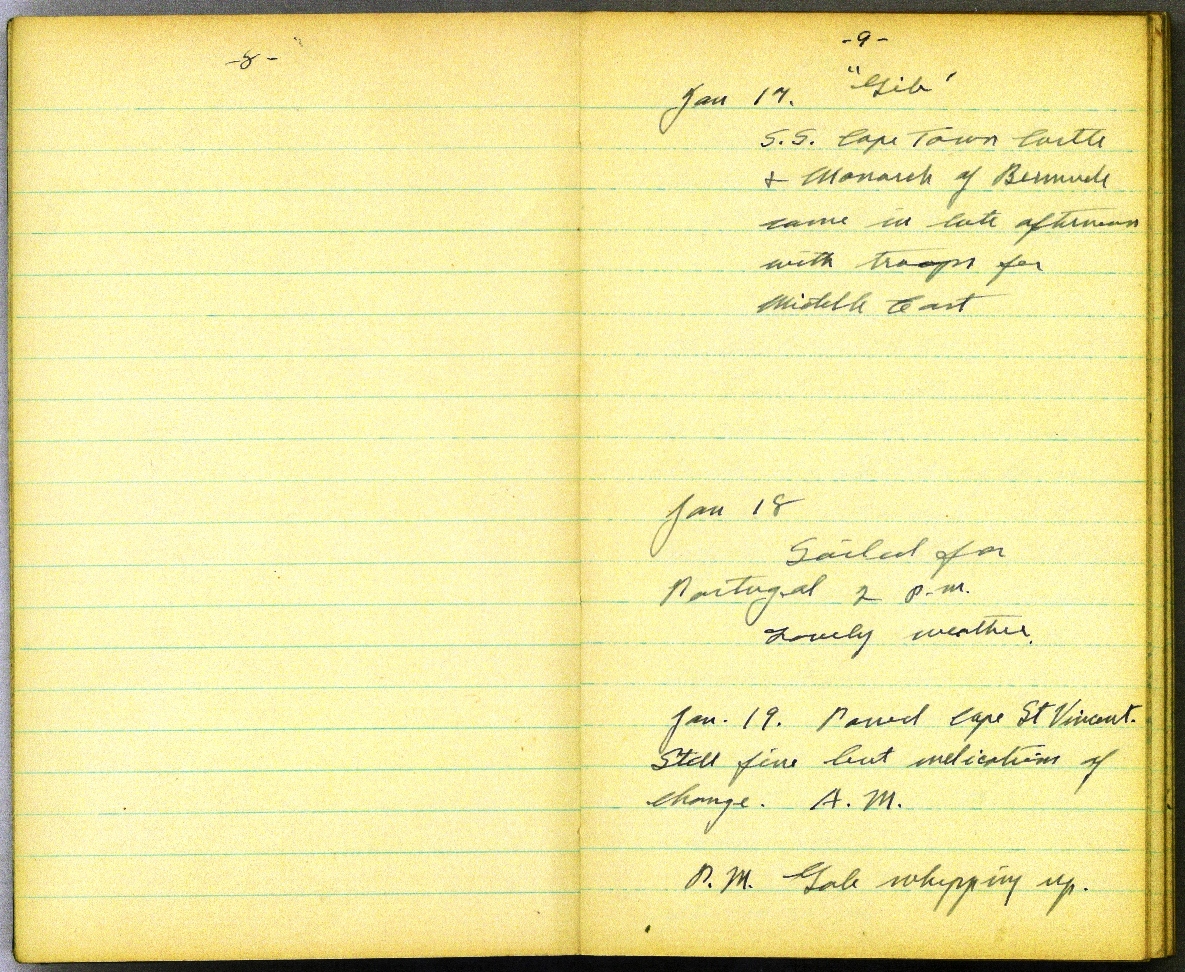
Jan 17. "Gib"
S.S. Capetown Castle & Monarch of Bermuda came in late afternoon with troops for Middle East.
Jan. 18.
Sailed for Portugal 2 p.m. Lovely weather.
Jan 19.
Passed Cape St. Vincent. Still fine but indication of change, A.M.
P.M. Gale whipping up.
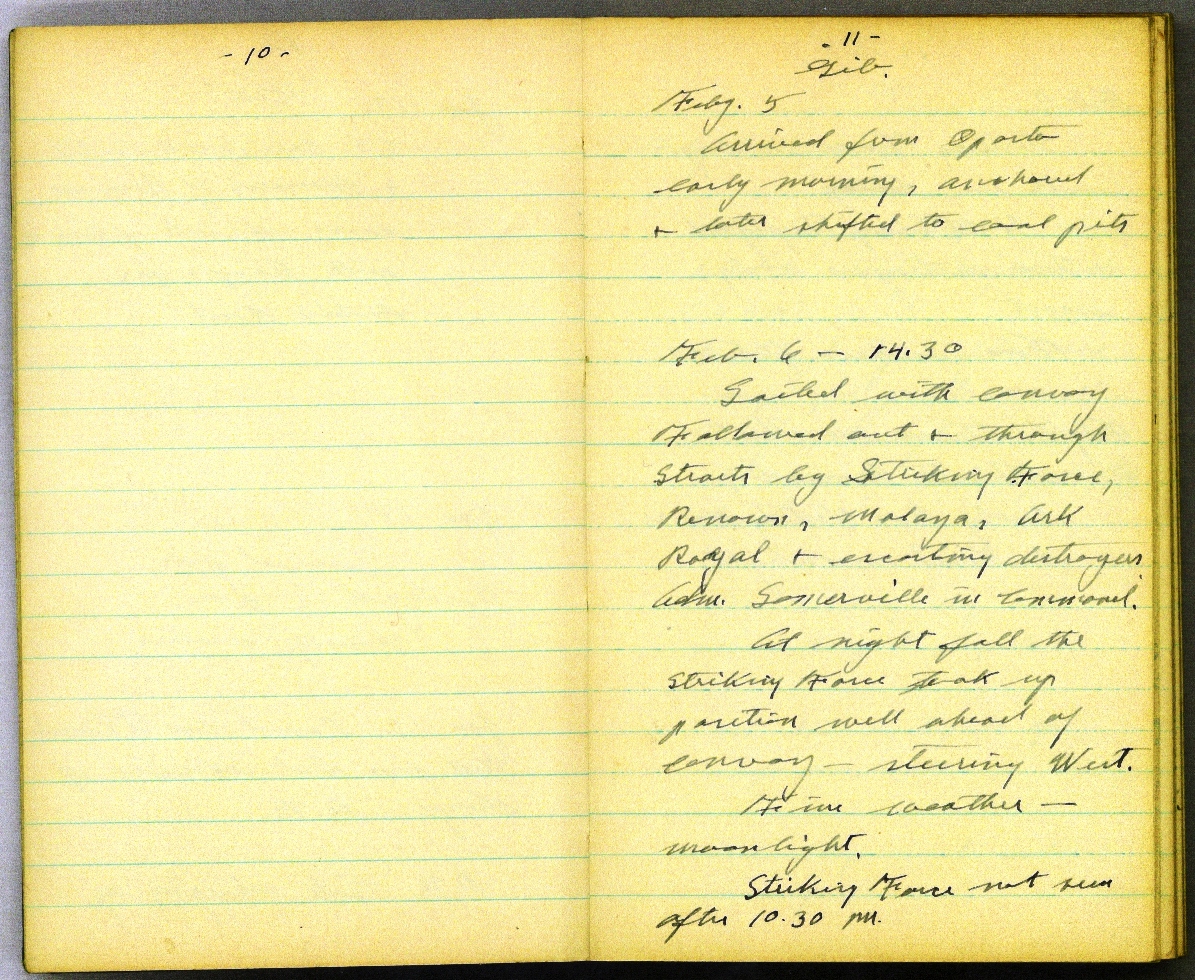
Feb 5. Gib
Arrived from Oporto early morning, anchored & later shifted to coal pits.
Feb 6. - 14.30
Sailed with convoy, followed out & through straits by Striking Force Renown, Malaya, Ark Royal & escorting destroyers. Admiral Sommerville in command.
At night fall the Striking Force took up position well ahead of convoy - steering west.
Fine weather - moonlight. Striking Force not seen after 10:30 pm.
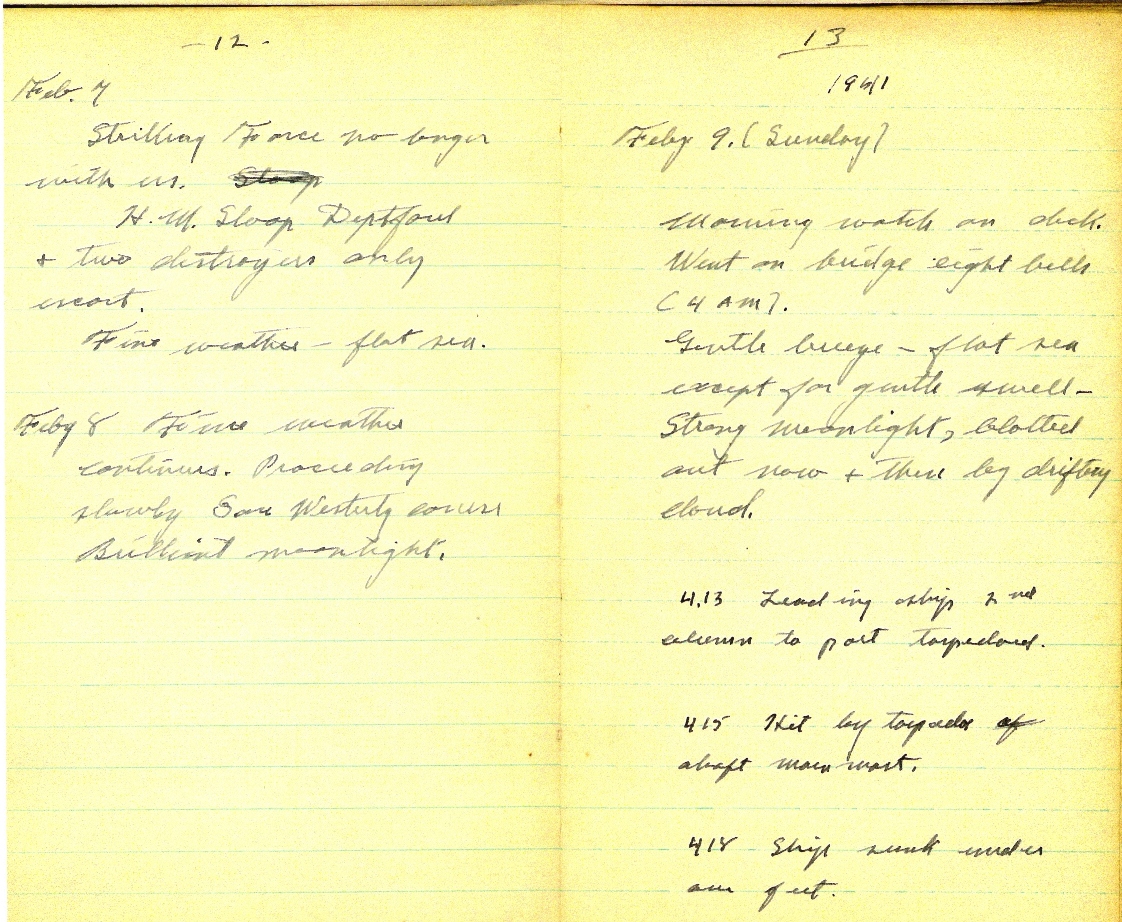
Striking Force no longer with us. H.M. Sloop Deptford & two destroyers only escort. Fine weather - flat sea.
Feb. 8
Fine weather continues. Proceeding slowly Sou Westerly course. Brilliant moonlight.
Feby 9. (Sunday)
Morning watch on deck. Went on bridge eight bells (4 A.M.)
Gentle breeze - flat sea except for gentle swell - Strong moonlight, blotted out now & then by drifting cloud.
(This next part was completed after his rescue)
4.13 Leading ship 2nd column to port torpedoed.
415 Hit by torpedo abaft main mast.
418 Ship sunk under our feet.
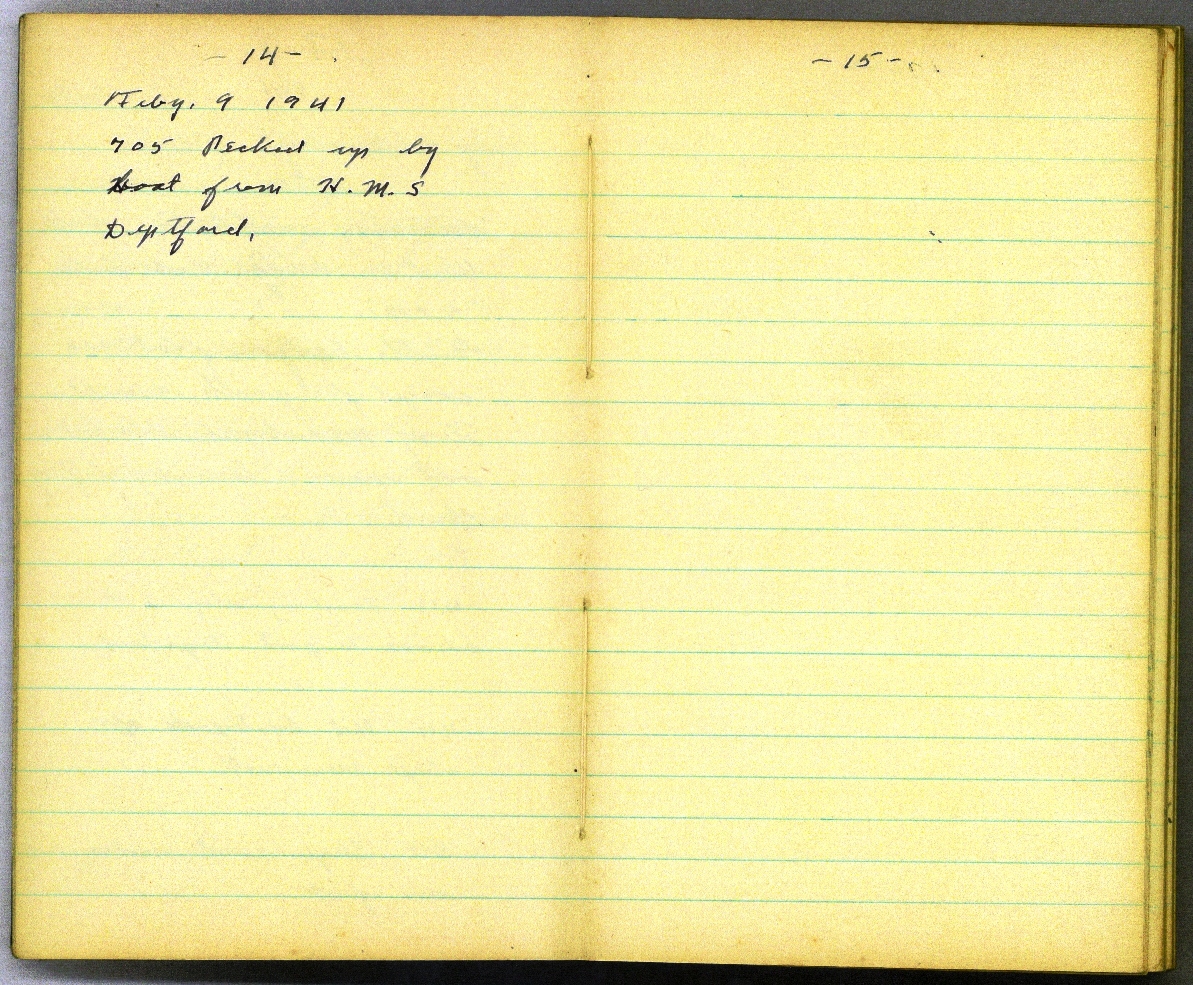
Feby 9. 1941
705 Picked up by boat from H.M.S. Deptford.
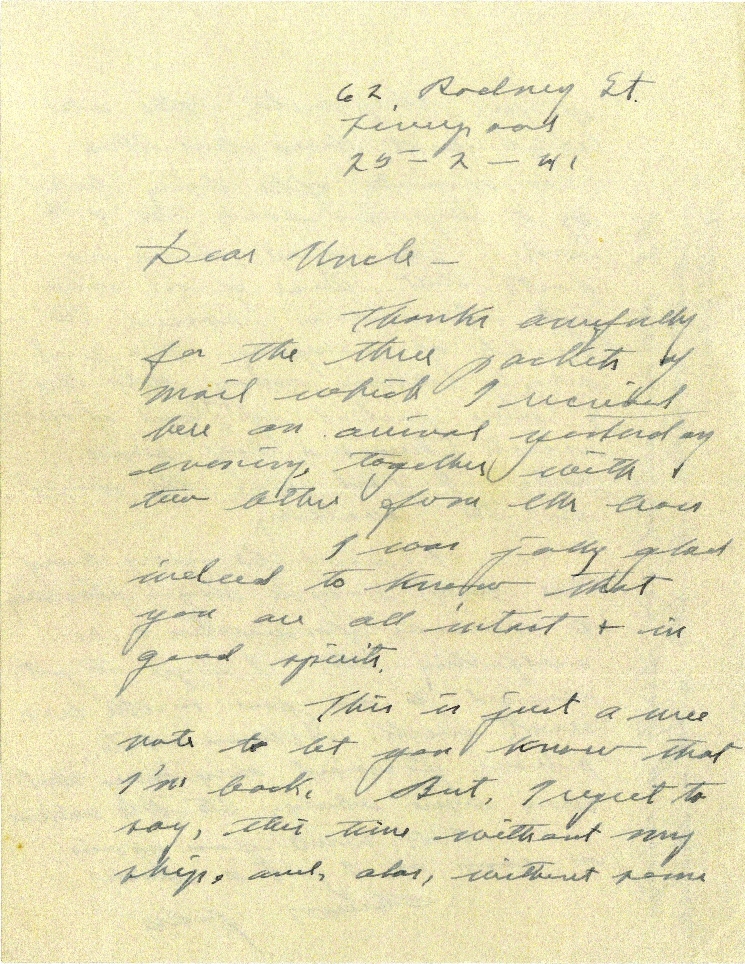
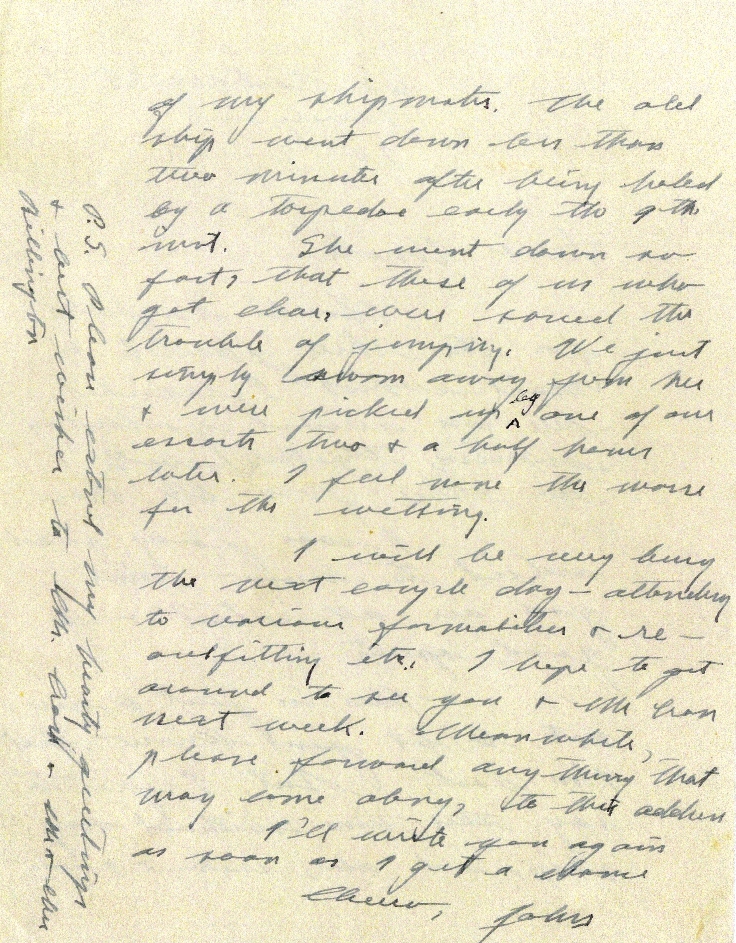
62 Rodney St.
Liverpool
25 - 2 - 41
Dear Uncle -
Thanks awfully for the three packets of mail which I received here on arrival yesterday evening, together with two others from Mr. Cross.
I was jolly glad indeed to know that you are all intact & in good spirits.
This is just a wee note to let you know that I'm back. But, I regret to say, this time without my ship, and alas, without some of my shipmates. The old ship went down less than two minutes after being holed by a torpedo early the 9th inst. She went down so fast, that those of us who got clear, were saved the trouble of jumping. We just simply swam away from her & were picked up by one of our escorts two & a half hours later. I feel none the worse for the wetting.
I will be very busy the next couple days - attending to various formalities & re-outfitting etc. I hope to get around to see you & Mr. Cross next week. Meanwhile, please forward anything that may come along, to this
address.
I'll write you again as soon as I get a chance.
Cheerio, John
P. S. Please extend my hearty greetings & best wishes to Mr. Cross & Mr. & Mrs. Billington.
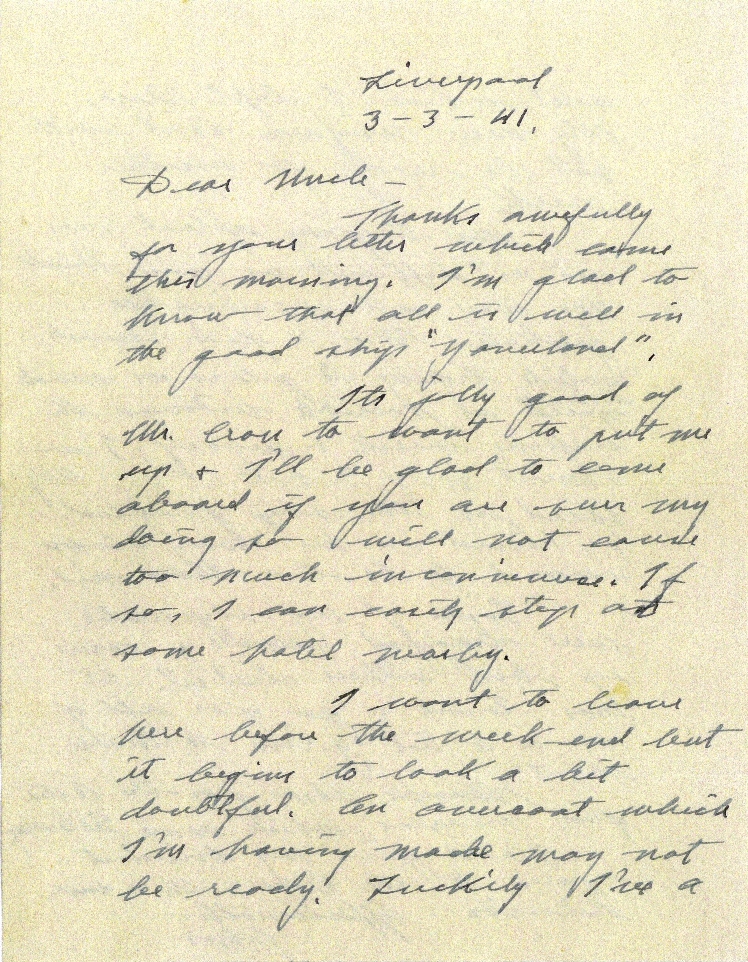
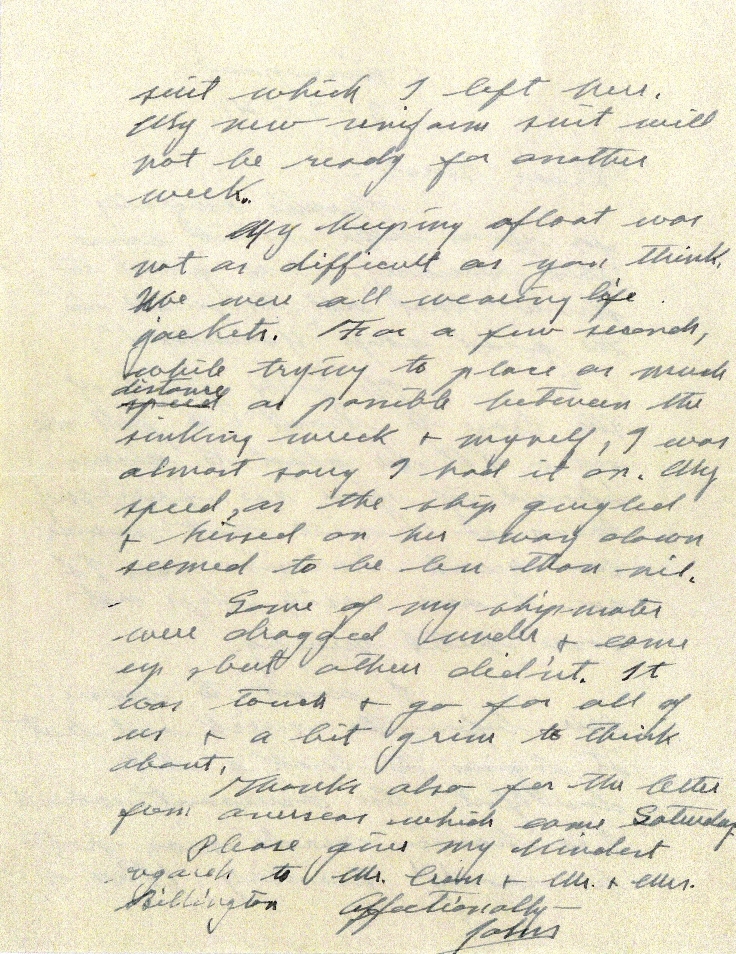
Liverpool
3 - 3 - 41
Dear Uncle -
Thanks awfully for your letter which came this morning. I'm glad to know that all is well in the good ship "Yaverland".
It's jolly good of Mr. Cross to want to put me up & I'll be glad to come aboard if you are sure my doing so will not cause too much inconvenience. If so, I can easily stop at some hotel nearby.
I want to leave here before the week-end but it begins to look a bit doubtful. An overcoat which I'm having made may not be ready. Luckily I've a suit which I left here. My new uniform suit will not be ready for another week.
My keeping afloat was not so difficult as you think. We were all wearing life jackets. For a few seconds, while trying to place as much distance as possible between the sinking wreck & myself, I was almost sorry I had it on. My speed, as the ship gurgled & hissed on her way down seemed to be less than nil.
Some of my shipmates were dragged under & came up, but others didn't. It was touch & go for all of us & a bit grim to think about.
Thanks also for the letter from overseas which came Saturday.
Please give my kindest regards to Mr. Cross & Mr. & Mrs. Billington.
Affectionately -
John
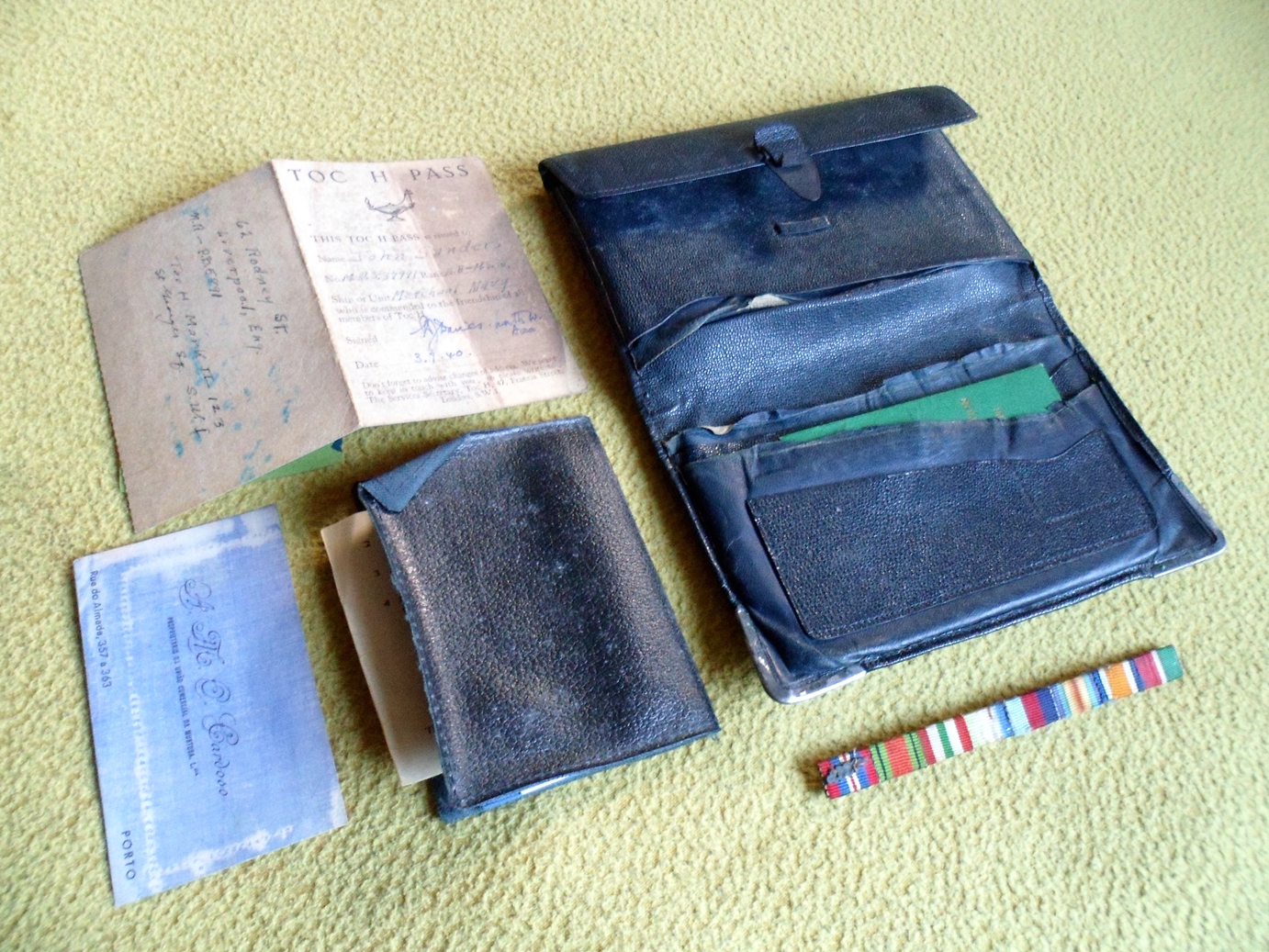
Here is a photo, "of items stained by the Atlantic salt, having been in Dad's pocket during his swim courtesy of Herr Clausen..." as provided by his son, Iain Sanders.
Return to the U-182 Page
Return to the USS MacKenzie Page
Thanks to Iain Sanders for all documentation provided on this page.